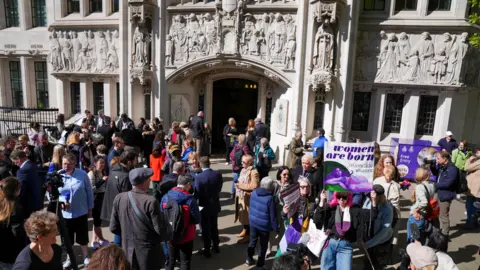The recent ruling by the UK Supreme Court has brought significant changes for public bodies regarding the definition of a woman. The court unanimously determined that under equalities law, a woman is defined by biological sex. This landmark decision will lead to new guidance for public bodies, including services provided by the National Health Service (NHS) and institutions such as prisons.
### Background of the Ruling
The ruling stems from a legal case brought forth by women’s rights advocates challenging the Scottish government’s approach to gender and sex-based protections. The campaigners argued that these protections should only be applicable to those identified as female at birth. This decision is poised to have widespread implications for various spaces, particularly women-only areas, including hospital wards, changing rooms, and domestic refuges.
On April 17, 2025, the Supreme Court judges articulated that within the context of the Equality Act, ‘woman’ refers explicitly to biological women, while ‘sex’ means biological sex. This verdict clarifies that obtaining a Gender Recognition Certificate (GRC) does not alter a person’s legal sex under the Equality Act, leading to further implications for transgender individuals.
### Guidance from the Equality and Human Rights Commission
In light of this ruling, the Equality and Human Rights Commission (EHRC) has stated its commitment to rapidly updating its code of conduct to reflect the changes instituted by the Supreme Court. The commission anticipates that this updated guidance will be in place by the summer of 2025. The existing guidance already permits specific exceptions for gender-segregated spaces, allowing for women-only areas in certain circumstances.
Under the new ruling, however, individuals who were assigned male at birth and identify as women will not have the right to access services designated for women, even if they legally changed their gender. This included transgender women holding a GRC, highlighting a significant shift in how gender identity is recognized in relation to equalities legislation.
### Implications for Women’s Rights and Gender Identity
The reaction to this ruling has been divided. Supporters of women’s rights view this as a victory for the safeguarding of single-sex spaces. Baroness Kishwer Falkner, chairwoman of the EHRC, expressed satisfaction with the judgment, indicating it addressed concerns previously raised by the commission. Conversely, trans-rights activists, including Scottish Green MSPS like Maggie Chapman, have criticized the ruling as a serious setback for human rights, claiming it negatively impacts one of the most marginalized communities in society.
The ruling may also create considerable ramifications in areas such as sports. Over recent years, numerous sports organizations have faced scrutiny regarding policies around transgender participation in women’s events. Following the Supreme Court’s decision, it is likely that sports organizations, including athletics, cycling, and aquatics, will further tighten guidelines to ensure compliance with the new legal definition.
### Government Response
The UK government has welcomed the Supreme Court ruling, asserting it provides clarity and confidence for service providers and women alike. Health minister Karin Smyth mentioned that the government would review the ruling to ensure compliance across organizations and guarantee that rights are upheld across the board. She emphasized the intention to navigate these challenging cultural conversations with respect for dignity, privacy, and rights for all individuals involved.
### Future Outlook
As public entities begin to adopt the newly defined guidelines, it remains crucial to observe the ongoing discourse surrounding gender identity, equality, and rights. Advocacy groups are likely to explore the possibility of appeals or legislative changes in response to the ruling. Ultimately, the UK Supreme Court’s decision marks a pivotal moment in the intersection of gender, rights, and legislative frameworks, setting the stage for continued debates and developments in the coming months.











